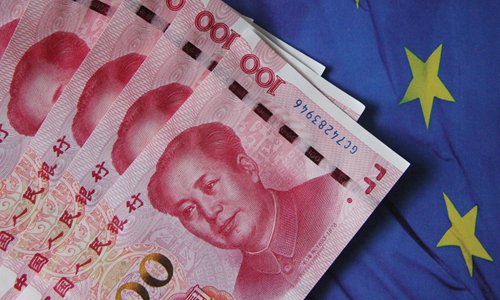
An investment agreement between China and the EU, for which negotiations started in 2013, is likely to be reached by 2020, and Chinese companies also long for a reciprocal opening-up from the bloc, experts said Thursday.
During Chinese President Xi Jinping's visit to France on Tuesday, he called for joint efforts to advance the negotiations on a China-EU investment agreement, the Xinhua News Agency said.
The China-EU investment agreement negotiations are one of China's most important economic and trade negotiations. The talks started in November 2013, aiming to reach a higher-level agreement covering investment protection and market access based on the agreements signed between China and EU member states, according to information released by China's Ministry of Commerce (MOFCOM).
So far, 19 rounds of consultations and 12 inter-sessional meetings have been held, MOFCOM said last November.
The business environment, labor standards and opening-up in sectors such as services, finance and high technology are the focus of the negotiations, Sun Yongfu, former director general of the European Department of MOFCOM and senior research fellow at Beijing-based think tank Taihe Institute, told the Global Times on Thursday.
Sang Baichuan, director of the Institute of International Business at the University of International Business and Economics, agreed, saying that the two sides are trying to reach a consensus on a negative list of investments to expand market access.
During the 20th China-EU Summit in July 2018, both sides exchanged suggestions for the list, marking a new stage of negotiations, MOFCOM spokesman Gao Feng told a press reference on November 15, 2018.
After intensive negotiations, the two sides reached an agreement on a number of important provisions in the text on investment liberalization and protection, Gao said, noting that substantial negotiations will be held on the lists covering investment market access.
As for the negative list, Sang said "this is an issue of exchange of interests and there won't be many obstacles, as there is also a legal guarantee from China's recently released Foreign Investment Law."
The EU has long believed that Chinese state-owned enterprises are government agencies and worried that their companies cannot achieve fair competition in the Chinese market.
China's new Foreign Investment Law, which was passed on March 15, is based on a system of pre-establishment national treatment plus a negative list. It aims to improve the transparency of foreign investment policies and ensure that foreign-invested enterprises participate in market competition on an equal basis.
After the Chinese president's visit to Europe, working groups from China and the EU will step up negotiations and promote related work, and it is possible that they will reach an agreement by 2020, said Sun.
Foreign media reported that the EU wants to seal an investment deal with Beijing by next year as it tries to broker a more coherent approach to China.
After the agreement is signed, it will replace the bilateral investment treaties all EU member states except Ireland have signed with China, Sun said, noting that the agreement, which is a high-level and updated version, will further advance bilateral trade and increase investment.
China is striving to create a fair and competitive business climate through efforts such as easing restrictions on foreign equity ownership, strengthening intellectual property protection and simplifying administrative approval procedures, which experts said "laid the foundation for sealing the agreement".
But some uncertainties emerging in the EU market such as stricter approval for Chinese investment are likely to affect the negotiations, Sang noted.
In December 2018, Germany tightened foreign investment rules by lowering the threshold for screening purchases of stakes in German companies by non-European buyers, aiming to fend off unwanted takeovers by Chinese investors, said media reports.
"China has been committed to further easing market access to foreign capital and it also hopes there will be a two-way opening-up," Sun said. "We hope that the EU could also reciprocally open up sectors like services, finance and high technology to Chinese enterprises."
Experts forecast the investment agreement between China and the EU is more likely to be reached before a bilateral investment treaty (BIT) between China and the US. China and the US began negotiations on a pact to govern bilateral investment in 2008.
The China-US BIT is on hold due to trade conflicts between the two countries, Sang said. "After the two countries reach an agreement on trade, the talks on the investment treaty can be restarted," he said.
China is the EU's third-largest investment destination and the bloc's eighth-largest source of investment. As of the end of 2017, the EU's investment stock in the Chinese market stood at 328 billion euros ($369 billion), while China's investment stock in the EU reached 216 billion euros, according to data released by China's Economic and Commercial Counsellor's Office of the Mission to the EU in December 2018.
Experts said although the European investment stock in China is higher than China's in the European market, the trend is toward increasing balance.
*This article was originally published on Global Times at http://www.globaltimes.cn/content/1143847.shtml
—————————————————————
FOCUS ON CONTEMPORARY NEEDS.
Should you have any questions, please contact us at public@taiheglobal.org